英语六年级上册Unit1
六年级英语上册unit1
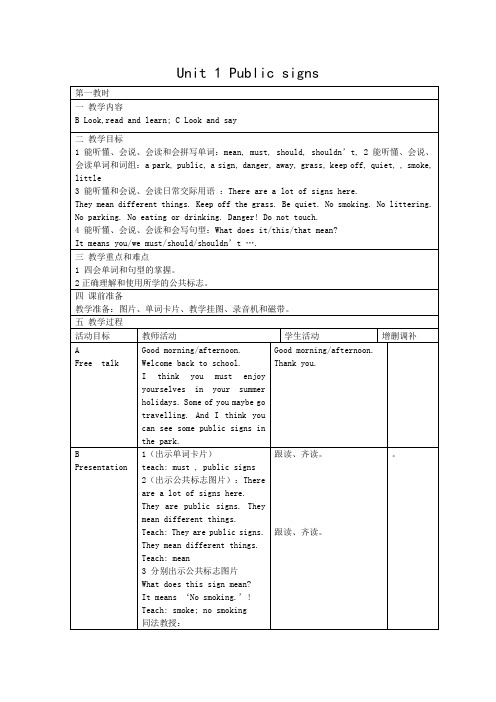
litter; no littering; no parking; no cycling; danger; no eating and drinking; keep off the grass; keep quiet; do not touch
跟读、齐读。
跟读、齐读。
。
C
Drill
1 快速出示公共标志图片
Unit 1 Public signs
第一教时
一 教学内容
B Look,read and learn; C Look and say
二 教学目标
1 能听懂、会说、会读和会拼写单词:mean, must, should, shouldn’t, 2 能听懂、会说、会读单词和词组:a park, public, a sign, danger, away, grass, keep off, quiet, , smoke, little
3 能听懂和会说、会读日常交际用语 :There are a lot of signs here.
They mean different things. Keep off the grass. Be quiet. No smoking. No littering. No parking. No eating or drinking. Danger! Do not touch.
齐读。
E
Play a game
分别出示图片
请一名学生上讲台看图片,然后说:It means ….
让其他学生猜
六 板书设计
No smoking No littering No parking
No cycling Danger No eating and drinking
六年级上册英语课文三篇【Unit1】
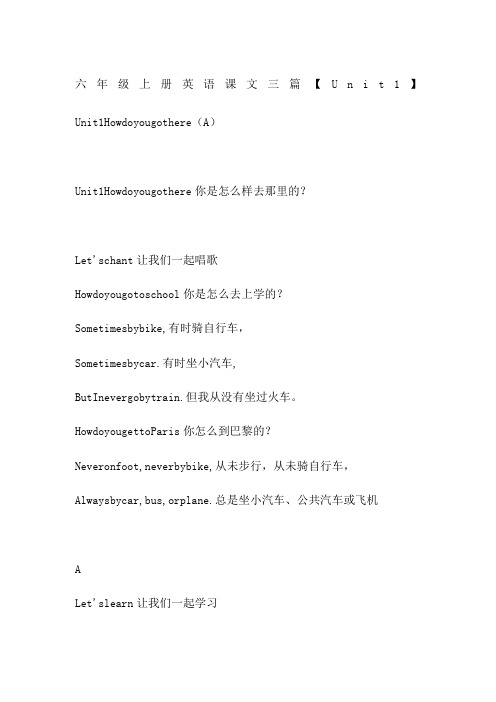
六年级上册英语课文三篇【U n i t1】Unit1Howdoyougothere(A)Unit1Howdoyougothere你是怎么样去那里的?Let'schant让我们一起唱歌Howdoyougotoschool你是怎么去上学的?Sometimesbybike,有时骑自行车,Sometimesbycar.有时坐小汽车,ButInevergobytrain.但我从没有坐过火车。
HowdoyougettoParis你怎么到巴黎的?Neveronfoot,neverbybike,从未步行,从未骑自行车,Alwaysbycar,bus,orplane.总是坐小汽车、公共汽车或飞机ALet'slearn让我们一起学习Howdoyougotoschool你怎么样去上学的?Igotoschoolbybike.我骑自行车去上学。
HowdoyougotoCanada你怎么去加拿大的?Igobyplane.我坐飞机去的。
byplane坐飞机byship坐船onfoot步行bybike骑自行车bybus坐公共汽车bytrain坐火车bysubway坐地铁Let'stryListenandcircle让我们试试听录音并圈出Howdoyougotoschool,Mike迈克,你怎么去上学Iusuallygotoschoolbybike,somtimesonfoot有时候我步行去上学Isyourhomenearourschool你的家是我们学校附近吗?Yes,itis.是的That’sfine.那很好Let'stalk我们一起说说Howdoyougotoschool,Sarah莎拉,你是怎么样去上学的?Myhomeisnear.我家很近。
UsuallyIgotoschoolonfoot.我通常步行去上学。
SometimesIgobybike.有时骑自行车去。
Whataboutyou你呢?Iusuallygotoschoolbybus.我通常坐公共汽车去上学。
六年级上册英语课文三篇【Unit1】
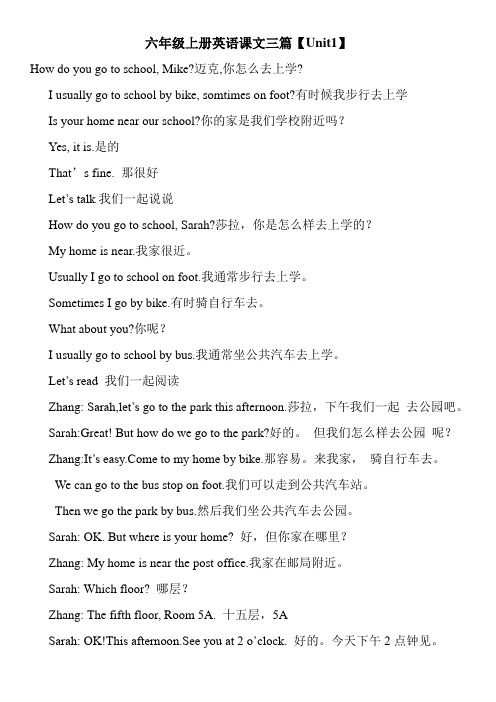
六年级上册英语课文三篇【Unit1】How do you go to school, Mike?迈克,你怎么去上学?I usually go to school by bike, somtimes on foot?有时候我步行去上学Is your home near our school?你的家是我们学校附近吗?Yes, it is.是的That’s fine. 那很好Let’s talk我们一起说说How do you go to school, Sarah?莎拉,你是怎么样去上学的?My home is near.我家很近。
Usually I go to school on foot.我通常步行去上学。
Sometimes I go by bike.有时骑自行车去。
What about you?你呢?I usually go to school by bus.我通常坐公共汽车去上学。
Let’s read 我们一起阅读Zhang: Sarah,let’s go to the park this afternoon.莎拉,下午我们一起去公园吧。
Sarah:Great! But how do we go to the park?好的。
但我们怎么样去公园呢?Zhang:It’s e to my home by bike.那容易。
来我家,骑自行车去。
We can go to the bus stop on foot.我们可以走到公共汽车站。
Then we go the park by bus.然后我们坐公共汽车去公园。
Sarah: OK. But where is your home? 好,但你家在哪里?Zhang: My home is near the post office.我家在邮局附近。
Sarah: Which floor? 哪层?Zhang: The fifth floor, Room 5A. 十五层,5ASarah: OK!This afternoon.See you at 2 o’clock. 好的。
人教(PEP)六年级上册英语Unit 1 (共10张PPT)

15、一个人炫耀什么,说明他内心缺 少什么 。。2021年5月 *21.5.10*May 10, 2021
16、业余生活要有意义,不要越轨。* *5/10/2021
17、一个人即使已登上顶峰,也仍要 自强不 息。*** 21.5.10
谢谢大家
9、 人的价值,在招收诱惑的一瞬间被决定 。21.5.1021.5.10Monday, May 10, 2021
14、抱最大的希望,作最大的努力。2021年5月10日 星期一 2021/5/102021/5/102021/5/10
15、一个人炫耀什么,说明他内心缺 少什么 。。2021年5月 2021/5/102021/5/102021/5/105/10/2021
16、业余生活要有意义,不要越轨。2021/5/102021/5/10May 10, 2021
14、抱最大的希望,作最大的努力。2021年5月10日 星期一 **21.5.10
15、一个人炫耀什么,说明他内心缺 少什么 。。2021年5月 *21.5.10*May 10, 2021
16、业余生活要有意义,不要越轨。* *5/10/2021
17、一个人即使已登上顶峰,也仍要 自强不 息。*** 21.5.10
11、人总是珍惜为得到。21.5.10**May-2110- May-21
12、人乱于心,不宽余请。***Monday, May 10, 2021
13、生气是拿别人做错的事来惩罚自 己。21.5.1021.5.10** May 10, 2021
14、抱最大的希望,作最大的努力。2021年5月10日 星期一 **21.5.10
17、一个人即使已登上顶峰,也仍要 自强不 息。*** 21.5.10
谢谢大家
小学英语六年级上册知识点:Unit1HowcanIgetthere-
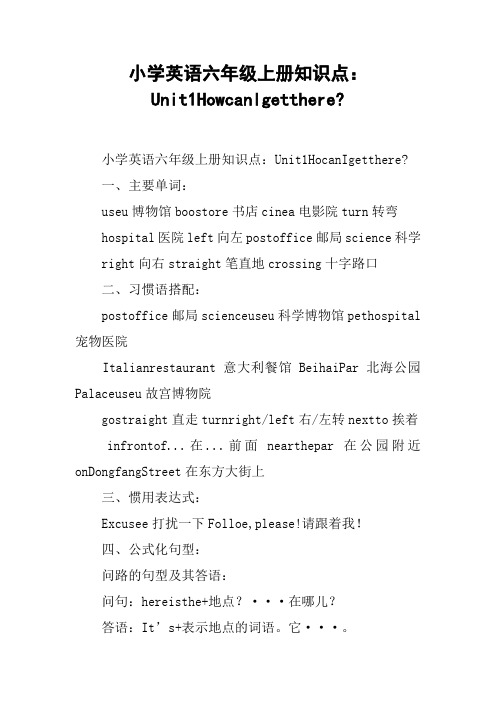
小学英语六年级上册知识点:Unit1HowcanIgetthere?小学英语六年级上册知识点:Unit1HocanIgetthere?一、主要单词:useu博物馆boostore书店cinea电影院turn转弯hospital医院left向左postoffice邮局science科学right向右straight笔直地crossing十字路口二、习惯语搭配:postoffice邮局scienceuseu科学博物馆pethospital 宠物医院Italianrestaurant意大利餐馆BeihaiPar北海公园Palaceuseu故宫博物院gostraight直走turnright/left右/左转nextto挨着infrontof...在...前面nearthepar在公园附近onDongfangStreet在东方大街上三、惯用表达式:Excusee打扰一下Folloe,please!请跟着我!四、公式化句型:问路的句型及其答语:问句:hereisthe+地点?···在哪儿?答语:It’s+表示地点的词语。
它···。
nexttotheboostore,nearthehospital/postoffice,overth ere,onDongfangStreet,infrontoftheschool...询问怎么到某地的句型及其答语:问句:Hocan+主语+get+地点?···怎么到···?同义句型:canyoutelletheayto+地点?hereis+地点?hichistheayto+地点?答语:Turn+方向+表示地点的介词短语。
···转。
atthecineaatthecornernearthepostoffice...五、例句:hereisthecinea,please?请问电影院在哪里?It’snexttothehospital.它与医院相邻。
新版PEP六年级英语上册Unit1
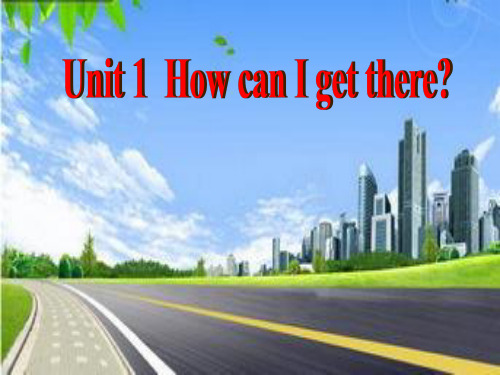
常用口语
• • • • • • • • 对不起 Can you help me? 你能帮帮我吗? It's over there. 它在那边。 Let's go. 我们走吧! Excuse me Follow me,please! 请跟我走! 它远吗? Is it far? I'm so hungry! 我很饿! Finally! 终于到了!
6. The park is B front of our school. A. on B. in C. at D. under 7. ---Where did you buy it? --- ____________. B A. Twenty yuan B. In the store C. OK. Let’s go. 8. ---Where is the museum? ---_____ C in front of the hospital. A. It B. There is C. It’s
2.We can see the films电影 at the
( cinema ). 3.If we are sick生病, we should go to the ( hospital ). 4.We can watch a dinosaur 恐龙show in the ( science museum ). 5.We can buy some books in the ( bookstore).
搭配题:
1. bookstore 2. science museum 3. post office 4. museum 5. cinema 6. hospital 7. library 8. park A.公园 B.书店 C.科学博物馆 D.邮局 E.博物馆 F.电影院 G.医院 H.图书馆
六年级上册英语-Unit1第一单元短语、词汇、知识点梳理 译林版(三起)
Unit1 The king’s new clothes知识点梳理一、短语积累1.the king’s clothes 皇帝的新装2.long long ago很久以前3.one day有一天4.two men/women 两个男人/女人5.like new clothes喜欢新衣服6.make…for给……做7.visit the king拜访国王8.show sth to sbshow sb sth展示给……看9.try on these magic clothes试穿这些魔力衣服10.clever / foolish people聪明/愚蠢的人a lot of/lots of/many people许多人11.walk through the city步行穿过这座城市12.look at看……13.in the street在街上14.shout at向…..大喊15.a little boy一个小男孩16.point at指着ugh at嘲笑18.in the new clotheswear the new clothes穿着新衣服wear yellow穿黄色的衣服19.fit well很适合20.get…from从……得到e to my party来参加我的聚会22.at half past four在四点半23.an American cowboy一个美国的西部牛仔24.a Scottish man一个苏格兰男人25.wear jeans穿着牛仔裤wear a kilt 穿苏格兰短裙26.play a game/play games做游戏,玩游戏27.tell a story/tell stories讲故事28.each/every student每一个学生29.say one sentence说一个句子30.on the mountain在山上31.the next sentence下一个句子32.live in居住在33.B obby’s turn博比的机会34.What’s next? 接下来呢?35.think hard冥思苦想36.have to不得不,必须37.start …again重新开始38.in the forest在森林里39.in front of在……前面40.by the house房子附近41.pick a flower/pick flowers 摘一朵花42.be angry 生气的43.pick up捡起,拾起44.give me your child把你的孩子给我45.be nice to her(宾格)对她很好46.live with the lion和狮子住在一起47.look after照顾48.turn into a prince 变成一个王子49.What beautiful clothes!多漂亮的衣服啊!二、重点句型、语法点拔1、there be结构在一般过去时的各种句型转换:There be结构的组成:There be + 名词短语+方位短语.(数量词+名词)(1)肯定句:e.g.: Long long ago, there was a king. /There were a lot of people in the street.(2)否定句:在be动词was或were后+not, some要改成any.e.g.: There were some people in the street.(否定句)There were not any people in the street.(3) 一般疑问句及其肯定和否定回答:e.g.: A: Was there a house on the mountain?B: Yes, there was. / No, there wasn’t.(4)有关there be的特殊疑问句的问答:A1:What was in front of the lion’s house?(针对名词短语提问)B1: There were some flowers .A2: How many houses were there on the mountain?(针对数量词提问)B2: There was one.2、动词在一般过去时中的变化:a、be动词在一般过去时中的变化:was/were.其中Checkout time中的circle and say进行了重点操练。
六年级英语上册 Unit 1 知识考点
六年级上册Unit 1 Language Points【知识考点一】问路的句型及其答语:问句:Where is the + 地点?......在哪儿?答语:It’s + 方位词组+地点。
它在 ......e.g. Where is the cinema, please? 请问电影院在哪儿?next to the bookstore 紧挨着书店in front of the school 在学校的前面It’s behin d the park 在公园的后面near the zoo 在动物园的附近over there 在那边【知识考点二】want 的用法1)want to +动词原形+ 其他想要去做......2)want +名词想要......e. g. I want to buy a postcard. 我想要去买一张明信片。
She wants a robot. 她想要一个机器人。
【试试看】1. They want ____________ send it today.2. Mary ____________ to go to the hospital.3. Tom and Robin ____________ (想要)three books.【知识考点三】Excuse me 和sorry 的区别:1)“Excuse me.”用于事情未发生之前引起他人的注意,意为“对不起;劳驾;打扰了”e.g. Excuse me. Where is the science museum?打扰一下,请问科学博物馆在哪?2)“Sorry.”常用于因某种过失给他人造成麻烦或打扰他人之后,用来表示歉意,意为“对不起”e.g. Sorry. I’m late. 对不起,我迟到了。
【知识考点四】next to 和 near 的区别next to 和near 都可以表示较近的距离,但两者仍有区别:1)next to 表示“挨着;与......相邻”e.g. My home is next to the school. 我家与我们的学校相邻。
六年级上册英语UNIT1
PART A重点词组
• Want to +动词原形 想要做某事 (单项选择题易出现) • Send+东西 邮寄什么东西 • Will+动词原形 将要做某事,表示将来时
PART B 重点句型
• What an interesting film! 多么有趣的电影啊! • It’s next to the park on Dongfang street.它在东方大街上 紧挨着公园。 • How can we get there?我们怎么到那?
UNIT ONE
第一单元
•how
can I get there?
我怎样到那?
本单元情景分析
• 学会问路,当你到了一个陌生的地方,不知道目的地在哪里,要说:
where is …? 或者:how can I get to …?
• 学会指路,当别人向你问路,告诉别人:It’s next
to…./near…/behind…/beside…等等或者go straight, turn left/right at…
练习题
)1.他想表达让我们直走然后在书店左转,这样说: A.Turn left at the bookstore. B.Let’s go straight and turn left at the bookstore.
( )2.他想说我们在电影院前面,这样说:
A.We are in front of the cinema. B.We are behind the cinema.
( )3.那看起来很美味。 A.That looks beautiful. B. That looks tasty.
练习题
( )4.打扰一下,泰晤士河是离这远吗? A.Sorry,Is the Thames far from here? B. Excuse me. Is the Thames far from here?
六年级英语上册Unit1课件 共19页
It means “Keep off the grass”.
Be quiet
It means you shouldn’t make noise.
It means you should keep quiet. It means “Be quiet”.
climb the tree.
• It means you shouldn’t take photos.
It means “ No climbing ” . It means you shouldn’t walk on the grass . It means “ No littering ”. It means “ No taking photos ” . It means you should eat or drink. It means “ No not touch ”
Today is ___ . Ben and his ____ , Jack are in the park . Jack is only ___ years old , but he always has a lot of question . He ____ some ___ _____ in the park . He is asking Ben some questions ___ them .
- 1、下载文档前请自行甄别文档内容的完整性,平台不提供额外的编辑、内容补充、找答案等附加服务。
- 2、"仅部分预览"的文档,不可在线预览部分如存在完整性等问题,可反馈申请退款(可完整预览的文档不适用该条件!)。
- 3、如文档侵犯您的权益,请联系客服反馈,我们会尽快为您处理(人工客服工作时间:9:00-18:30)。
Bill took the No.5 bus to the Children’s Park yes
2、他by经p常la乘ne飞=机去fly云to南。 He often goes to Yunnan by plane .
He often flies
to
Yunnan.
3、你on通fo常ot步=行上wa学lk吗t?o Do you usually go to school
(2) Where is Zhang Peng’s home? His home is near the post office .
Let’s read 知识点
1.Let’s go to the park. Let's=Let us,让我们,let后用动词原形;
2. We can go to the bus stop on foot. 情态动词can后用动词原形; Bus stop: 公交站
A: How do you go to school?
B: My home is_n_e_a_r. Usually I go to school_o_n_f_o_o_t . Sometimes I go _b_y_b_i_ke_. What about you ?
A: I usually go to school _b_y_b_u_s_.
3、Mr Peter昨天乘飞机去了北京。
Mr Peter went to Beijing by plane
.
Mr Peter went to Beijing
on a plane
.
注意其他表达方式:
1、昨by天,buBsill坐= 五tak路e公a 共bu汽s 车to…去…儿.童公园。
Bill went to the Children’s Park by the No.5 bus.
by ship
How do you go to Shanghai ? I go by train.
by train
How do you go to...? I go to … by...
Beijing
Guilin
America
Shanghai
Xi’an
Let’s play
school
I go to school by bike
3. The fifth floor 序数词前用定冠词the;
4. This afternoon. See you at 2 o’clock. This afternoon/morning/week 今天下午、早
Let’s read
Answer the questions
(1) How do Zhang Peng and Sarah go to the park?
First, they meet at Zhang Peng’s home. Next, they can go to the bus stop on foot . Then they go to the park by bus.
Always
:总是100%
Usually
:通常80%
Sometimes :有时30%
Never
:从未0%
By bus /Fast
Bike /cheap
I go to school_b_y_b_u_s_. Because it’s_f_a_s_t___.
By car /far
On foot /near
by subway
I go to school by car.
By car
Tips:介词by+交通工具(要用单数且前 不加任何修饰词),除了步行on foot
问一问你的同桌是怎么样来学校的.
How do you go to school?
I go to school on /
by ….
How do you go to school? I go to school … .
park
I go to the park by bike
zoo
I go to the zoo by subway
library
I go to the library on foot
Canada I go to Canada by plane
Xi’an
I go to Xi’an by train
Unit 1
How do you go there?
How do you go to school?
I go to school by bike.
by bike
I go to school by bus.
by bus
I go to school on foot.
on foot
I go to school by subway.
Shanghai I go to Shanghai by ship
注意还有其它的表达方式: by bike = on a bike. by bus=on a bus by plane = on a plane=by air by ship= on a ship= by sea
1、Tom通常乘自行车上学。
by car
on foot
by bus
by subway
by bike
暑假到了,让我们去加拿大 旅行吧!
How do you go to
Canada?
I go by ….
ቤተ መጻሕፍቲ ባይዱ
How do you go to Canada? I go by plane.
by plane
How do you go to Hainan? I go by ship.
Tom usually goes to school by bike .
Tom usually goes to school on a bike
.
2、她经常乘公共汽车去上班。
She often goes to work by bus
.
She often goes to work on abike .
on
foot
?
Do you usually walk to school?
4、我by叔叔ca经r =常乘dr小ive汽车to上班。 My uncle often goes to work by
car .
My uncle often drives
to work .
How do you go to+地点?
